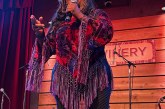
Beginning with Rage Against the Machine, followed closely by Audioslave and now, blowing both audiences and critics away with The Last Internationale, Wilk has lead an eventful life. The formation of his newest project picks up, in content, where the former left off, but this time with a blissfully soulful female voice and a bluesy guitar riddled backdrop. With a debut album and tour starting, and in the opening slot for Weezer none the less, The Last Internationale is fast on their way to worldwide phenomenon. Recently we caught up with Wilk to discuss rubber bullets, seduction and crystal balls.
The Last Internationale is a different take on what has become a standard theme in Wilk’s life and music. “What first drew me to them was a text message from my old bandmate (Tom Morello), asking what I was doing. His friends needed a drummer to go into the studio to record a couple of songs for their record. I got some of the songs that they were recording. That’s really what drew me to the band, the music. It had nothing to do with the politics. I really wanted to do something different. It was really hard competing with both Rage Against the Machine and Audioslave, for that matter. As far as I am concerned, those are two of the best singer/songwriter/performers. I just happened to be lucky enough to be in bands with both of those guys. When I first heard this music, it was such a breath of fresh air. I always wanted to be in a three piece and have an incredible female singer, like Delilah. When I got in the room with them, there was a chemistry forming right away. Originally, I was going to do two songs with them, but after a week they asked me to join there band and (laughing) who was I to say no? And so I didn’t, I said okay. We wound up making a record in December, while everyone else was sitting at home by their fireplace and christmas tree. It felt really good. There was just something about it that felt good and right. Making this record, I felt like every song that we recorded was better than the last. I am really proud of the record we made, and am really excited to play it live.”
Unlike anything in the world of popular music, the record is reminiscent of something written during the depression by someone living in the dust bowl. In this specific case, it seems as if the subject dictates the style. “One of the first things I noticed in these songs, is that I thought they were thoughtful, intelligent lyrics. It was exciting for me to hear that and to hear this unrest. The truth is, in the US and around the world, the rich are getting richer and the poor are getting poorer and the middle class is disappearing. Obama seems to be doing nothing about it. Our congress is still owned by massive corporations. So, any change that is going to happen, is not going to happen at the poles, but out in the streets. While I would love to see nonviolent change in this country, but historically speaking, that doesn’t happen very often. A lot of times, it takes people getting out in the streets and throwing bricks and lighting stuff on fire and burning down the White House, or whatever it is. That’s what it takes. This is coming from a guy who has two kids and would prefer to see a nonviolent change in the country. I just don’t see it happening, unfortunately.”
The politically charged nature of Wilk’s music, especially revisiting the days of Rage Against the Machine, insights both positive and negative backlash. In one particular music video, scenes of brutality were rampant. “I think what you are referring to is Rage Against the Machine playing the Democratic National Convention. Quite frankly, the police incited that riot. They put fences all around that place and expected people to exit the place through this one tiny hole. They started shooting rubber bullets at people. It was disgusting to me. I think with Rage Against the Machine, and with this band as well, we want to make people think. We know that people are going to dislike us and we know that people are going to like us. We have no problem with that. We want some type of reaction. With Rage Against the Machine, we had a lot of people that liked us and at the same time, on the other side, we had the same amount of people who hated us. We were okay with that, as long as we were evoking thought. That was our goal and definitely that is one of our goals in The Last Internationale as well.
To borrow from T.S. Elliot, “Not with a bang, but a whisper.” This is the difference between styles of Wilk’s former and current projects. “I think with this band, it is more of a seduction, at first, in giving people the message. That is just the nature of the band. Rage Against the Machine is completely different vocally than this band and thank God, because I would hate to repeat myself like that. I feel like our message is just as powerful and just as strong, and that is, if you are unhappy with the situation and you see injustice and you feel inequality, it is time to get out into the streets and we’re happy to be the soundtrack to that revolution. However, we don’t have all the answers. When you really start listening to what the lyrics are saying, you might not get that at first listen. Those are my favorite bands, those that have a deeper underlying message.”
Looking back at a life in music that is still leaving marks on new generations, Wilk shares two memories from his historical past. “It was the experience that Rage Against the Machine was, always blew me away. It was the people. Our fans were incredible and loyal. I was just amazed. If you are really passionate about something,…and it came back to us ten fold. And to have that happen, felt incredible to me. The other thing, was making a record with Black Sabbath. I was thirteen or fourteen years old, playing Black Sabbath on the turntable and trying to learn Black sabbath songs. If I ever had a crystal ball and saw myself making a record with them, I would never have believed it.”







